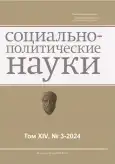Потенциал искусственного интеллекта в расследовании преступлений: за или против
- Авторы: Берова Д.М.1, Тутуков А.Ю.1
-
Учреждения:
- Северо-Кавказский институт повышения квалификации (филиал) Краснодарского университета Министерства внутренних дел России
- Выпуск: Том 14, № 3 (2024)
- Страницы: 96-100
- Раздел: Новые решения в правотворчестве
- URL: https://journals.eco-vector.com/2223-0092/article/view/635474
- DOI: https://doi.org/10.33693/2223-0092-2024-14-3-96-100
- EDN: https://elibrary.ru/IYFBWZ
- ID: 635474
Цитировать
Полный текст
Аннотация
Цифровые технологии прочно вошли в жизнь каждого человека, проникли во все сферы. Развитие искусственного интеллекта, а также меры, направленные на его использование в целях обеспечения национальных интересов и реализации стратегических национальных приоритетов, признаны стратегическим направлением научно-технологического развития российского государства. Исследование возможностей искусственного интеллекта в основном проводится с точки зрения ее технической и гражданско-правовой составляющей. Но в последние годы технологии искусственного интеллекта широко внедряются и в правоохранительную деятельность, в частности в практику расследования и раскрытия преступлений.
Цель настоящей статьи – проанализировать возможности искусственного интеллекта и определить целесообразность или нецелесообразность его использования при расследовании преступлений. Для достижения указанной цели рассмотрен понятийно-категориальный аппарат, проанализированы признаки искусственного интеллекта, на основе которых раскрываются преимущества и недостатки применения данной технологии правоохранительными органами.
Авторами делается вывод о целесообразности использования искусственного интеллекта при расследовании преступлений при учете всех возможностей и ограничений рассматриваемой технологии.
Полный текст
Об авторах
Джульетта Михайловна Берова
Северо-Кавказский институт повышения квалификации (филиал) Краснодарского университета Министерства внутренних дел России
Автор, ответственный за переписку.
Email: berova-d@yandex.ru
SPIN-код: 1908-7973
доктор юридических наук, доцент, полковник полиции; профессор, кафедра специальной технической подготовки
Россия, г. НальчикАльберт Юрьевич Тутуков
Северо-Кавказский институт повышения квалификации (филиал) Краснодарского университета Министерства внутренних дел России
Email: Lel4993@rambler.ru
SPIN-код: 8425-5677
кандидат юридических наук, доцент; доцент, кафедра действий ОВД в особых условиях
Россия, г. НальчикСписок литературы
- Васильев А.А., Шпоппер Д., Матаева М.Х. Термин «искусственный интеллект» в российском праве: доктринальный анализ // Юрислингвистика. 2018. № 7.
- Каплиев А.С. Критика национальной стратегии развития искусственного интеллекта на период до 2030 года // Право и государство: теория и практика. 2020. № 2 (182).
- Мансуров Г.З. Понятие и признаки искусственного интеллекта // Право и государство: теория и практика. 2023. № 11 (227).
- Папышева Е.С. Пределы допустимости участия искусственного интеллекта в постановлении приговора // Пробелы в российском законодательстве. 2023. Т. 16. № 5.
- Пономарева Е.В. Субъекты и квазисубъекты права: теоретико-правовые проблемы разграничения: дис. ... канд. юрид. наук. Екатеринбург, 2019.
- Соломонов Е.В. Понятие и признаки искусственного интеллекта // Вестник Омского университета. Серия: право. 2023. Т. 20. № 4.
- Сретенцев А.Н. К вопросу о возможностях искусственного интеллекта в решении задач криминалистической науки // Государственная служба и кадры. 2023. № 4.
- Чаннов С.Е. Робот (система искусственного интеллекта) как субъект (квазисубъект) права. Актуальные проблемы российского права. 2022. № 17 (12).
- Чердаков О.И. Отношение государства и бизнеса к разработке и внедрению технологий искусственного интеллекта в российскую финансовую сферу и экономику // Банковское право. 2022. № 5.
Дополнительные файлы








